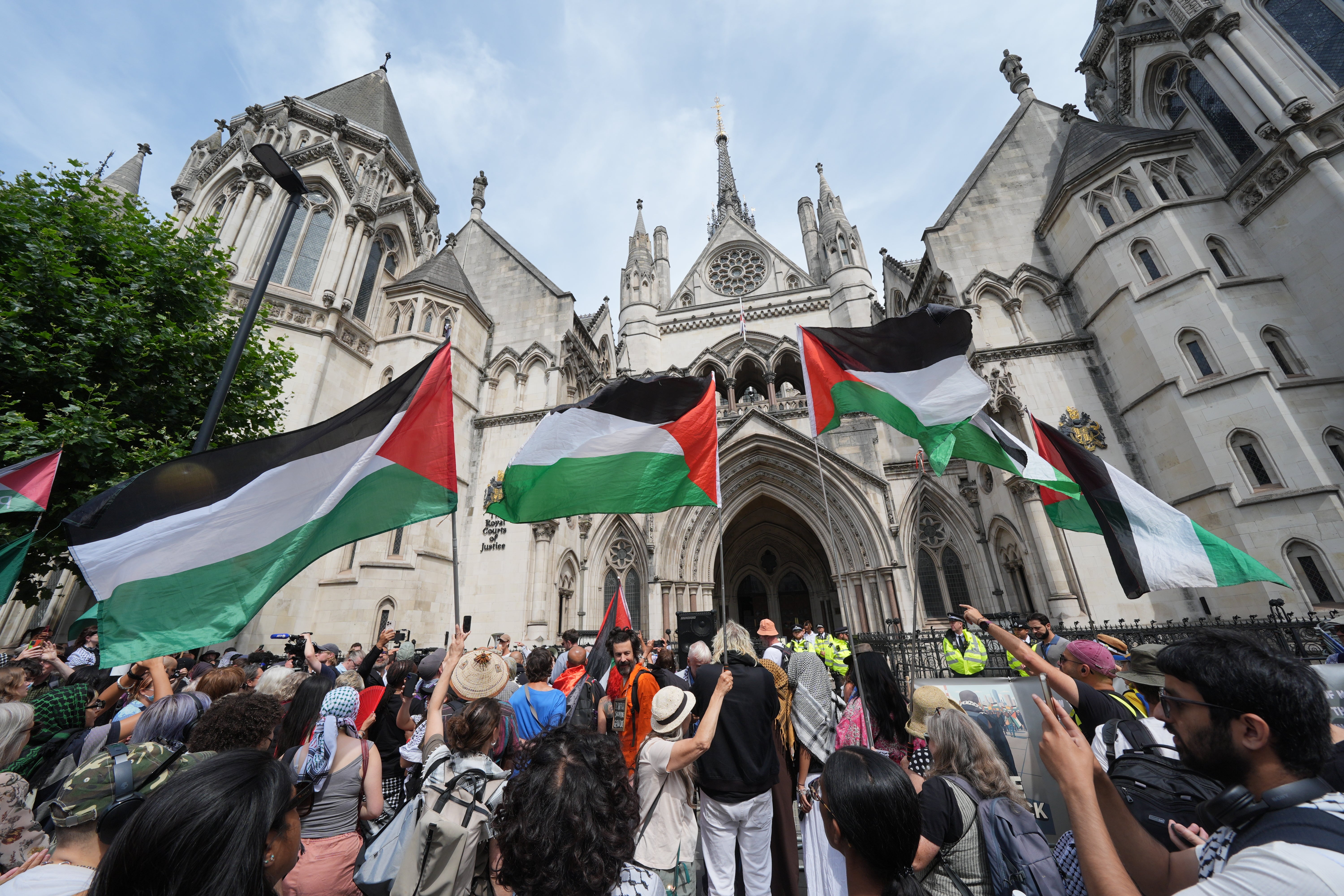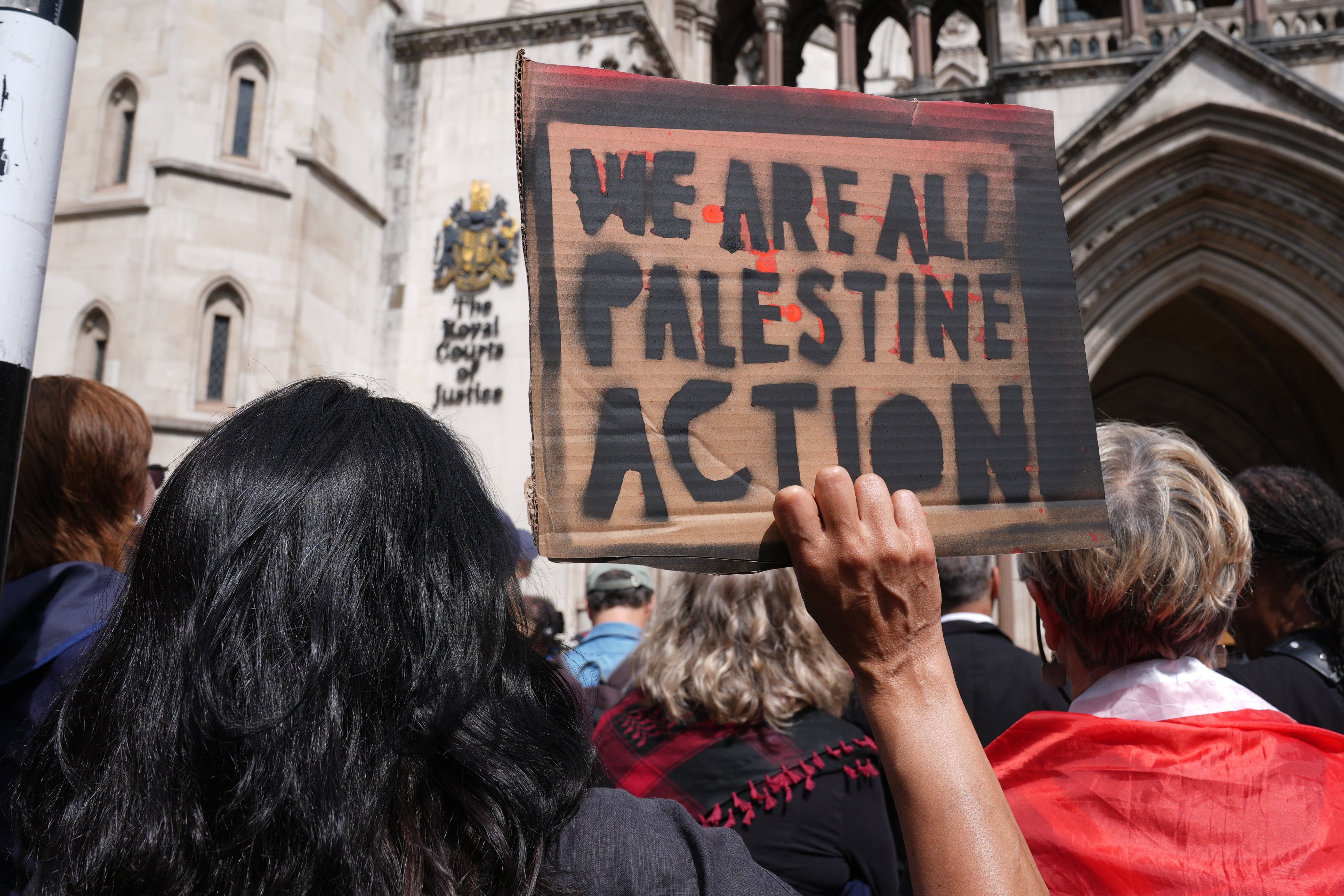Palestine Action will be able to challenge the Home Office in court over its proscription as a terrorist organisation, a judge has ruled.
Huda Ammori, the co-founder of the group, has sought to challenge the government’s decision to ban the organisation under anti-terrorism laws.
Home secretary Yvette Cooper decided to proscribe the group after activists broke into RAF Brize Norton in Oxfordshire and sprayed two military planes with red paint.
She also cited the group’s protest at a weapons equipment factory in Glasgow in 2022, which reportedly caused more than £1m worth of damage, and its targeting of Elbit Systems UK, an Israeli defence technology company, in her decision.
The ban came into force in early July making supporting Palestine Action a criminal offence, with membership or expressing support for the group punishable by up to 14 years in prison.
In his judgment on Wednesday, Mr Justice Chamberlain said that reports of arrests of pro-Palestine protesters, who were not expressing support for Palestine Action, “have a chilling effect on those wishing to express legitimate political views”. He said this was “an indirect consequence of the proscription order”.
The judge cited the arrest of Laura Murton, who was questioned by armed officers for holding a sign with the words “Free Gaza” and a Palestinian flag. In another recent case, a man was arrested under the terrorism act for holding up a Private Eye cartoon at a demonstration in Leeds.

Dozens of people have been arrested across the UK at events related to Palestine Action, with the order making it illegal to wear T-shirts or hold signs expressing support for the group.
Mr Chamberlain said that it was "reasonably arguable" that the proscription "amounts to a disproportionate interference" of Ms Ammori's rights to freedom of expression and freedom of assembly.
Mr Chamberlain added that it would be better to allow a judicial review against the Home Office’s proscription as it would be faster than referring the case to a bespoke tribunal, as the government had proposed.
He also said that one of the arguments that will go onto a full legal challenge was about whether the home secretary should have consulted Palestine Action before banning the group. He said: “It was reasonably arguable that a duty to consult arose and reasonably arguable that there was no compelling reason why consultation could not have been undertaken here.”
More than 80 organisations are already proscribed under the Terrorism Act 2000, including al-Qaeda and the Wagner group.
Britain’s proscription of Palestine Action was condemned as a “disturbing misuse” of counterterror laws by the United Nations human rights chief last week.
Volker Turk urged the UK to lift the ban, which he said was “disproportionate and unnecessary”.
Blinne Ni Ghralaigh KC, for Ms Ammori, argued that the judge should stay the proscription of Palestine Action ahead of the upcoming court case. She said that the “restriction on speech for those three months is irreparable”.
She added: “The order should be suspended less and until all of that is resolved by the court. It should not fall to members of the public to bear the brunt of measures that are extraordinarily broad.”
Mr Chamberlain refused this application, meaning the proscription order remains in force.
Responding to the High Court ruling, Greenpeace UK's co-executive director, Areeba Hamid, said: "Protests, even when they are disruptive or inconvenient, are absolutely not the same thing as terrorism.

"We support this decision and hope the judicial review will reveal this proscription order for the sinister and anti-democratic move it is.
"Treating direct action as terrorism is a dangerous and worrying escalation of the ongoing crackdown on protest and freedom of speech in the UK."
Green party peer Baroness Jones of Moulsecoomb urged the government to “lift this ban before being further ridiculed in the courts and internationally”.
“Spraying paint on refuelling planes that campaigners believe are used to help the ethnic cleansing in Gaza is not terrorism. It’s criminal damage, for which we already have laws,” she added.
Earlier this month, lawyers for Ms Ammori asked a judge to allow her to bring a High Court challenge over the ban, describing it as an “unlawful interference” with freedom of expression.
Raza Husain KC, for Ms Ammori, told the court that the ban had made the UK “an international outlier” and was “repugnant”.
Mr Husain added: “The decision to proscribe Palestine Action had the hallmarks of an authoritarian and blatant abuse of power.”
Sir James Eadie KC, for the Home Office, said in written submissions that by causing serious damage to property, Palestine Action was “squarely” within part of the terrorism laws used in proscription.
He said: “There is no credible basis on which it can be asserted that the purpose of this activity is not designed to influence the government, or to intimidate the public or a section of the public, and for the purpose of advancing a political, religious, racial or ideological cause.”
Channel-crossing migrants brought to shore by Border Force and lifeboats
Migration fuels second largest annual jump in population in over 75 years
Who are Palestine Action? The proscribed group taking the government to court
Ozzy Osbourne funeral latest: Sharon and Metallica stars attend private service
Airlines battle to recover operations after air traffic control glitch
‘There is only one Ozzy Osbourne’: Birmingham bids farewell to heavy metal icon







